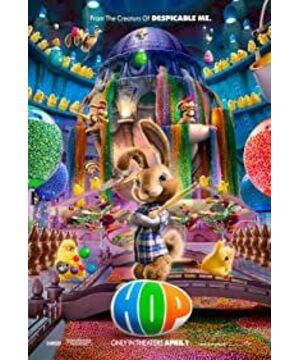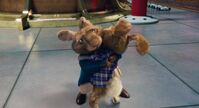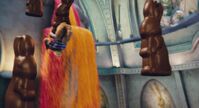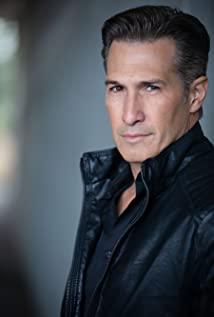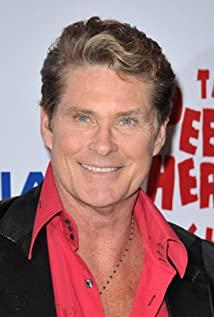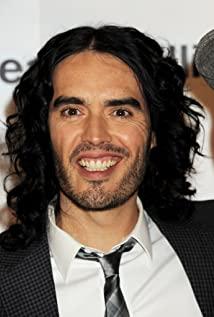The protagonist is of course the virtual rabbit named EB, but the plot actually includes a young man named Fred, who is not small in my worldly eyes. After the little rabbit EB struggled to break free from the shackles of the Easter factory, he ran away from home all the way. Fred is a companion to each other and encourages each other to realize the so-called ideal that is inconceivable in the eyes of normal people. The ending is naturally the dream that you can get with your eyes closed, and everyone is happy.
The color of the film is as gorgeous as candy, and the technology is not superb, but there is nothing to choose from. It's just that after reading such a bloody story, it completely subverted my previous judgment on Hollywood cartoons. If you once mistakenly thought that the current American movies may only be cartoons to watch, but after watching this film, the only words that can be used for compliment can only be words such as "cute" and "cute". Yes, these are purely technical standards, not created by plot.
It cannot be said that there are no surprises. The surprise is seeing Penny's cameo in the film "The Big Bang Theory". Of course, because of the supporting role, there is no outstanding performance, but this can only barely be regarded as the only surprise.
On the contrary, it is such an animated film that is believed to be for many American children. There are two scenes that vilify Chinese culture. The story beyond the absurd left a deep impression on me. I admit that as a Chinese, this bad movie has stepped on my sore feet.
Less than a quarter of an hour after the beginning of the film, the little rabbit EB hopes to realize the dream of playing drums and seeing the world in the conversation with his father, but his father wants to entrust EB with the important task of giving the Easter candy they produce to every country. Candy people will be very happy, but EB cited China as a counterexample. The scene immediately turned to show a backward Chinese scene, a rude Chinese shrew holding a broom and sweeping out the cute-looking but enthusiastic candy-giving bunny, mercilessly throwing the beautiful candy basket out the door, swearing in Chinese and sweating profusely. "Get out! Get out!", while chasing the poor little rabbit and fleeing.
Seeing this, my heart suddenly tightened. If I see the first ridicule, I feel faintly uncomfortable, and in the middle of the film, a similarly meaning shot appears again-in order to contrast the wonderful performance of Bunny EB participating in the audition, paving the way for the boring and boring lion dance picture- —It makes me a little irritated.
Americans, what do you want to illustrate through this fairy tale film? What do you want to present to audiences in the U.S. and even the world? What do you want to tell their next generation implicitly?
This also reminded me of the placement of a certain domestic milk in another blockbuster film "Transformers 3" that I saw a few days ago. At that time, the domestic irony was almost focused on why dubious quality domestic milk could be implanted into Hollywood commercials, but ignored that little funny Chinese man in the elevator holding domestic milk with cheap humor.
Look, no matter how much the Chinese government spends on New York’s Times Square to showcase China’s image, it’s not as good as the American way of presenting the backward, autistic, and well-intentioned China in their minds in front of the world. The Chinese are just like A full-faced and unreasonable image. It is not surprising that Hollywood practitioners export American values through powerful commercial power, but this time, it is too obvious and explicit.
Hasn't the United States always advertised itself as a melting pot of multiculturalism? Doesn't everyone have a very high political sensitivity to race and color? Isn't it impossible to vilify the image of minorities in public casually? ...I
don't know if anyone has noticed that there is almost no ugly black and black culture in American movies. If some people say that Hollywood is hindering the color of the president at the moment, what about movies from many years ago? Morgan Freeman in "Fake God", the inspirational Will Smith father and son in "When Happiness Knocks on the Door", Halle Berry in "Blood and Tears", each image of justice, kindness and warmth seems to tell the world the United States , As a large country with a history of immigration culture, how broad-minded and generous is the tolerance for people of color.
What about their treatment of Chinese and Chinese culture? If the clues in the recent Hollywood blockbusters are not intended to target Chinese Americans living in the United States, can they be understood as their intention to target the Chinese culture that accompanied the growth of these Chinese, or the eastern homeland behind them?
So I remembered that some people were boycotting the heartfelt words of "Kung Fu Panda 2" before the release-Americans don't really like Chinese culture, they want to use it to make money at the box office.
And in China, a group of spectators who pursue Hollywood blockbusters, while being slapped in the face, are still digging into their pockets to treat so-called advanced civilizations from across the ocean like gods.
View more about Hop reviews


